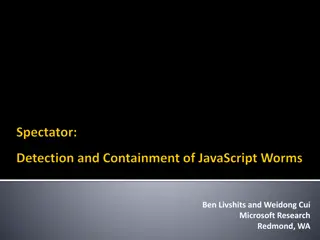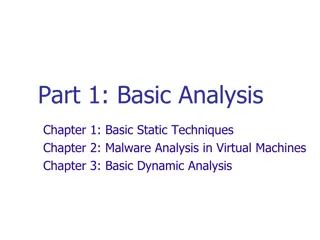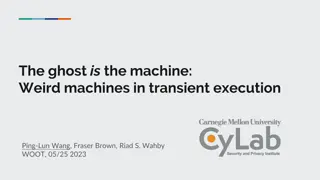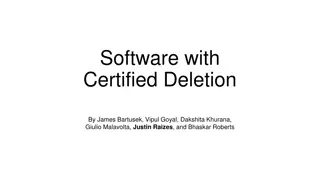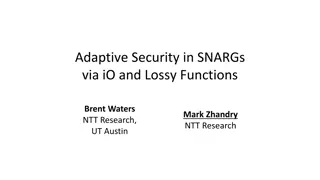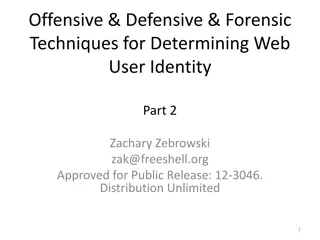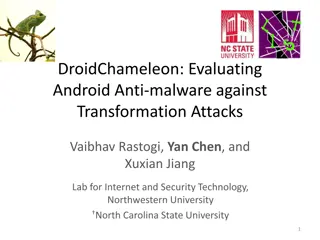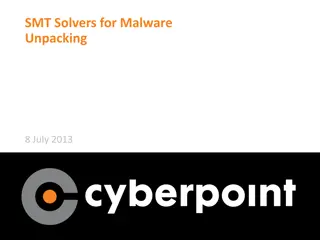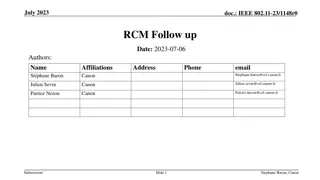Exploring Web Application Vulnerabilities and JavaScript Worms
Web applications face pervasive vulnerabilities, with Cross-site Scripting (XSS) leading the threats. The domination of XSS and buffer overruns has enabled the propagation of JavaScript worms, exemplified by infamous cases like Samy's MySpace outbreak. These exploits, marked by obfuscation and polym
1 views • 20 slides
Location Privacy Protection Strategies: A Comprehensive Overview
This study delves into optimal strategies to safeguard location privacy against localization attacks in the realm of location-based services. Discussing the shortcomings of anonymization and obfuscation as standalone defenses, it explores the challenges and pitfalls in designing effective protection
0 views • 26 slides
Comprehensive Malware Analysis Techniques
This detailed guide covers basic static techniques, malware analysis in virtual machines, and basic dynamic analysis. It includes information on static analysis, such as examining payloads without execution, file signatures, and signatures generated via analysis. Additionally, it delves into counter
0 views • 17 slides
Understanding Weird Machines in Transient Execution
Weird machines refer to models exhibiting unintentional behaviors triggered by adversarial inputs. They serve as computation primitives, enabling tasks like program obfuscation and secret computations. TSX weird machines, computing with time, manipulate cache states through gates like Assign, AND, O
0 views • 18 slides
Encrypted Data Deletion for Cloud Storage Servers
Explore the concept of software with certified deletion for private cloud storage servers. Discover how data recoverability is influenced by secret key leaks and encryption scheme vulnerabilities. Learn about techniques for computing on encrypted data and ensuring provable deletion, with a focus on
0 views • 29 slides
Advanced Security Concepts in SNARGs Using iO and Lossy Functions
Explore the latest research on Adaptive and Selective Soundness in Succinct Non-interactive Argument of Knowledge (SNARGs), presenting theorems and the inclusion of subexponentially secure techniques like indistinguishability obfuscation, one-way functions, and very lossy functions. Discover the pot
0 views • 20 slides
Understanding Anti-Anti-Virus Techniques and Retroviruses
Explore the world of anti-anti-virus techniques including Retroviruses and Entry Point Obfuscation. Learn about the methods used by viruses to evade detection and damage anti-virus software. Discover how Retroviruses like Ganda virus operate stealthily to hinder anti-virus programs. Delve into strat
0 views • 24 slides
Techniques for Protecting Web User Identity: Part 2 Overview
Explore offensive, defensive, and forensic techniques for safeguarding web user identity in this detailed guide by Zachary Zebrowski. Learn about obfuscation methods, browser protection, and important caveats to enhance online privacy. Discover strategies like borrowing a neighbor's network, using s
0 views • 45 slides
Evaluating Android Anti-malware Against Transformation Attacks
This study evaluates the effectiveness of Android anti-malware solutions against transformation attacks, focusing on the resistance to various types of malware obfuscations. It explores different transformations such as repacking, trivial changes, and sophisticated obfuscation techniques. Ten popula
0 views • 23 slides
Exploring SMT Solvers for Malware Unpacking
In this informative content, we delve into the world of malware analysis, binary packers, and the challenges posed by obfuscation techniques. The article discusses tools like UPX and Themida, as well as the complexities of virtualization and handler obfuscation in unpacking malware. Understanding th
0 views • 24 slides
RCM Procedure for Secure Parameter Obfuscation in IEEE 802.11 Networks
The document discusses the RCM procedure within IEEE 802.11 networks, focusing on obfuscating parameters like MAC addresses for enhanced security during CPE Client and CPE AP association. It outlines mechanisms for changing MAC addresses, SN, PN, AID, and TID without connection loss. The proposal su
0 views • 12 slides
